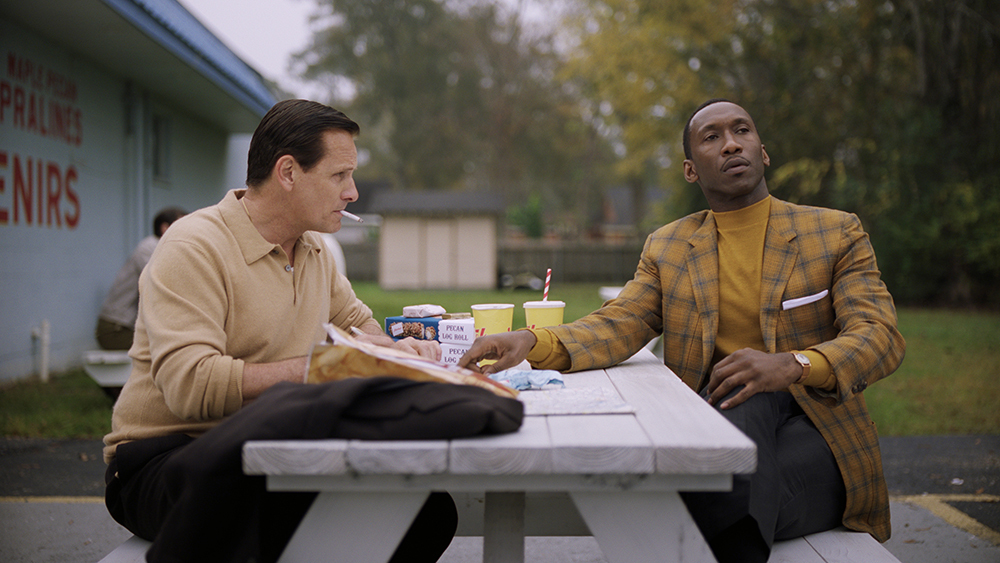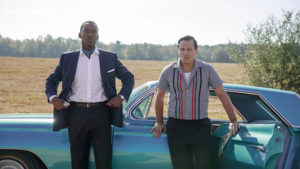‘Green Book’ Review: Don’t Miss This “Wonderful and Meaningful” Crowd-Pleaser

From one of the dudes that brought you There’s Something About Mary, Shallow Hal and Dumb & Dumber comes . . . a crowd-pleaser that’s both wonderful and meaningful. Believe it. Green Book, directed and co-written by Peter Farrelly, already earned enthusiastic standing ovations at the Toronto International Film Festival and the SCAD Savannah Film Festival. Now this gem — about the unlikely real-life friendship between a New York City bouncer and a renowned black piano player in the 1960s — is poised to be the most surefire bet of the holiday season.
Sufficiently hyped yet? Well here’s the piece de resistance: It features two virtuoso performances. The great Viggo Mortensen plays Tony “Lip” Vallelonga, a tough-tawkin’ Italian-American bouncer at the Copacabana that solves problems with a knuckle sandwich. With his attitude and brash accent, he could have been one of Tony Soprano’s henchmen at the Bada Bing. (Incidentally, the real Tony had a reoccurring role as a mob boss on The Sopranos.) He got the nickname, he explains, because he’s “the biggest bulls—t artist in the Bronx.”

Ali and Mortensen put serious mileage on that car. (Universal)
Tony Lip is also the exactly the kind of guy Don Shirley needs to drive him through the Deep South. Moonlight Oscar winner Mahershala Ali plays the legend, a regal, classically trained piano player who has a doctorate in music and lives in a palatial apartment above the famed Carnegie Hall in Manhattan. He performs in a trio for wealthy people all over the country but is about to embark on a two-month tour through the Midwest and down into the delta states. Given that we’re in 1962, he needs assistance. This is an era — all of 56 years ago — when a genteel host can pay his talent handsomely and yet refuse to let him use a toilet with indoor plumbing because of the color of his skin. Green Book, in fact, refers to the travel guide of the same name that Tony and Shirley must use to guide them through designated hotels and restaurants.
Though the narrative arc is formulaic, it works. Tony starts off the movie as a sort-of racist, throwing away two glasses that black workers in his home recently used. (His loving wife, played by Linda Cardellini, dutifully scoops them out of the trash.) Early on, he makes it crystal-clear that he’s taking the thankless job simply for the cash. He works for the record company, he intones to strangers, not the black man in the backseat. Shirley, in turn, is aghast by his driver’s unruly behavior — he shovels food into his mouth, smokes in the car, he pockets a jade stone without paying for it. He’s unfamiliar with Aretha Franklin’s music and winces at the thought of holding a Kentucky Fried Chicken drumstick. Faced with conflict, Tony fights with his fists while Shirley prefers use restraint. They exchange several back-and-forth barbs until the mutual respect kicks in.

Ali’s tuxedo and talent mean nothing to the man at his right. (Universal)
I expect some theatergoers to dub Green Book as a sort-of Driving Miss Daisy in reverse. You know, two opposites hit the road together and eventually reach Friendship-ville. And there is a valid argument in noting that once again a white guy has made a movie in which another white person learns a lesson in race relations. But I believe the light-hearted dramedy is more akin to the classic 1987 Steve Martin/John Candy comedy Planes, Trains and Automobiles— and not just because of the extended sequence in which Tony and Shirley desperately try to make it back to New York City in time for a holiday. This is a movie about the power of friendship in the most trying of times. Tony and Shirley don’t just learn from each other; this is heroic two-hander in which they both save each other.
The two performances are pitch-perfect. Mortensen rarely does comedy, let alone broad comedy. And yet he crafts a tender bear of a man, a loyal guy who’d give you the shirt of his back and probably knows the name of every person in his neighborhood. He loves his wife, he loves his pizza and hot dogs. (Mortensen put on 30 pounds to play Mr. Lip; beyond the physical, notice the way he uses hand gestures to accentuate his words.) The magnificent Ali has the more complex role — a wise, dignified, soft-spoken man who should enjoy the spoils of his riches. Yet he’s trapped by the society he lives in and almost completely isolated. The pair’s natural, award-worthy chemistry carries the movie.
I’m not sure when “crowd pleaser” became such a dirty word. As if cheering for a feel-good movie isn’t allowed in a film if it overtly solicits warm and fuzzies. To that I say, fuhgettabout the cynics. Take the Green Book trip — and don’t forget the pizza or the tissues.
Green Book opens in select theaters on Friday, November 16 and everywhere on Wednesday, November 21.






